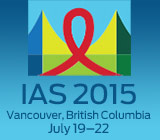 A real-world study of Truvada (tenofovir/emtricitabine) as pre-exposure prophylaxis (PrEP) among Brazilian transgender women and men who have sex with men (MSM) has found that those at highest risk of contracting HIV were the most likely to participate, HIVandHepatitis.com reports. Preliminary participation data from the demonstration project, which enrolled high-risk participants between April 2014 and April 2015, were presented at the 8th International AIDS Society Conference on HIV Pathogenesis, Treatment and Prevention in Vancouver, British Columbia.
A real-world study of Truvada (tenofovir/emtricitabine) as pre-exposure prophylaxis (PrEP) among Brazilian transgender women and men who have sex with men (MSM) has found that those at highest risk of contracting HIV were the most likely to participate, HIVandHepatitis.com reports. Preliminary participation data from the demonstration project, which enrolled high-risk participants between April 2014 and April 2015, were presented at the 8th International AIDS Society Conference on HIV Pathogenesis, Treatment and Prevention in Vancouver, British Columbia.
A total of 986 people were either self-recruited or directly recruited for the demonstration project. Among them, 82 (8 percent) tested HIV positive, and 106 did not fit the criteria for entry into the study. The other 798 people were asked to attend a screening visit; 490 (61 percent) did so. Three more people then tested positive for HIV and a few others were disqualified for medical reasons. A total of 427 people then went to their first visit to enroll in the trial.
A total of 409 people (51 percent of those eligible) ultimately started PrEP. Twenty-four of them (6 percent) were trans women, which amounts to the largest proportion of such individuals in any PrEP study to date. The eligible trans women participated at a rate of 67 percent.
Factors that tended to predict enrolling in the study, given that someone was eligible, included having a steady partner and a greater self-predicted likelihood of acquiring HIV in the next year.
After controlling for various factors, the researchers found that the strongest predictors of attending the first screening visit were having condomless sex with two or more recent partners, and being transgender.
To read the HIVandHepatitis article, click here.
Advertisement
Advertisement
Advertisement






Comments
Comments